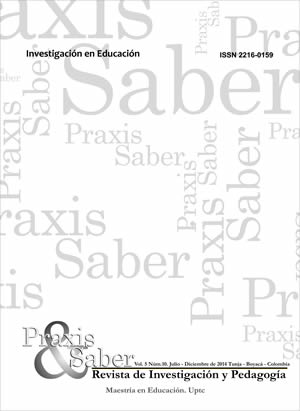Recovering the anthropological thing... a need of education

Abstract
The paper has the aim of identifying the type of subject built both in the classroom and in the school context mediated by the reality that sets new educational challenges. Since the research problem was a qualitative one, it was carried out a sociolinguistics research exercise focused on the faceto-face interaction patterns in significant contexts or environments and in the cultural products. As a result, it is possible to state that the restrictive view of the educational process implies to foster, in the international and national academic community, a systematic consideration on the kind of subjectivity or professional identity promoted in the current educational processes. Then, it is concluded that it underlies the human construction that individuals live in their socio-historical dimension -since they have multiple meanings of their own reality-, which, in turn, looks for the construction of human condition as an opposition to the relationship between the theoretical and practical world.Keywords
subject, education, anthropological foundation, culture
References
- ALEXANDER, J. (2006). 'Cultural pragma TIC: social performance between ritual and strategy'. Alexander, J., Giesen, B. & Mast, J. [Eds]. Social performance: symbolic action, cultural pragma TIC, and ritual. Cambridge Cultural Social Studies: Cambridge University Press. https://doi.org/10.1353/tech.2006.0109
- Beltrán, H. (1996). Claves para estudiar, redactar y presentar informes científicos. Usta.
- Buber, M. (1949). Qué es el hombre. México: Fondo de Cultura Económica.
- BOURDIEU, P. (1985). 'The social space and the genesis of groups'. Theory and Society [14, 6, 723-744]. https://doi.org/10.1007/bf00174048
- https://doi.org/10.1177/053901885024002001
- Bourdieu, P. (1997). Capital cultural, espacio social y escuela. Bogotá: Siglo XXI Editores.
- Bürger, C. & Bürger, P. (2001). La desaparición del Sujeto: una historia de la subjetividad de Montaigne a Blanchot. Madrid: Akal.
- CONVENIO SOBRE LA DIVERSIDAD BIOLÓGICA (CDB). Enfoque ecosistémico. Recuperado el 14 de diciembre de 2013 de http://www.conabio.gob.mx/institucion/cooperacion_internacional/doctos/enfoq_eco.html
- Durkheim, E. (1982). Las reglas del método sociológico. Barcelona: Orbis.
- Durkheim, E. (1987). La división social del trabajo. Madrid: Akal.
- FAJNZYLVER, V. (2001). 'Videoanimación en Chile: audiovisual, relativismos, y construcción de nuevas identidades'. Revista Comunicación y Medios [13, 12]. Universidad de Chile: Departamento de Investigaciones Mediáticas y de la Comunicación.
- FOUCAULT, M. (1988). 'El sujeto y el poder'. Revista Mexicana de Sociología [50, 3, 3-20]. https://doi.org/10.2307/3540551
- FOX, N. (1998). 'Foucault, foucauldians and sociology'. The British Journal of Sociology [49, 3, 415-433]. https://doi.org/10.2307/591391
- Frank, J. (1995). 'Preparing for the information highway: information technology in Canadian households'. Cannadian Sociology, Trends Autumn [2-7].
- Freire, P. (1988). La educación como práctica de la libertad. Barcelona: Siglo XXI Editores.
- Freud, S. (1994). La Psicología de las masas. México: Fondo de Cultura Económica.
- Gómez, A. (1996). Ética nicomaquea – política. México: Porrúa.
- Hernández, R.; Fernández, C. & Baptista, P. (2010). Metodología de la Investigación. México: Mc Graw Hill.
- Jost, F (2002). 'El culto de la televisión como vector de identidad'. Revista del instituto de la comunicación e imagen [13]. Universidad de Chile.
- Maturana, H. (1996). Desde la biología a la psicología [3ª ed.]. Santiago de Chile: Universitaria.
- Moraes, M. C. & Torre, S. (2002). 'Senti pensar bajo la mirada autopoiética o cómo re-encantar creativamente la educación'. Creatividad y Sociedad [2, 41-56].
- Kant, E. (1987). Comienzo presunto de la historia humana. México: Fondo de Cultura Económica.
- Levi Strauss, C. (1969). Antropología Existencial. Buenos Aires: Eudeba.
- PALMA N., A. (2004). 'Estudio de los signos gráficos en las conversaciones de Internet'. Comunicación Política [15].
- Pasquali, A. (1998). Bienvenido Global Village. Caracas: Monte Ávila.
- Rocher, G. (1973). Introducción a la sociología general. Barcelona: Herder.
- Rousseau, J. (2003). Discurso sobre el origen de la desigualdad. México: Ediciones Guernika.
- Rousseau, J. (2007). El contrato social. Buenos Aires: Editorial Gradifco SRL.
- Suárez, N. (2008). Educación. Condición de humanización [1ª ed.]. Colección Universidad de Caldas.
- ZEMELMAN, H. (2001). Pensar teórico y pensar epistémico. Los retos de las ciencias sociales latinoamericanas. [Conferencia magistral dictada a los alumnos del posgrado Pensamiento y Cultura en América Latina de la Universidad de la Ciudad de México].
Downloads
Download data is not yet available.